人教新目标八年级下册Unit1 Will people have robots重点短语
- 格式:doc
- 大小:24.00 KB
- 文档页数:2
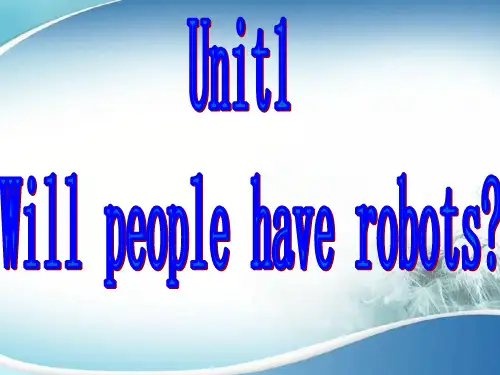
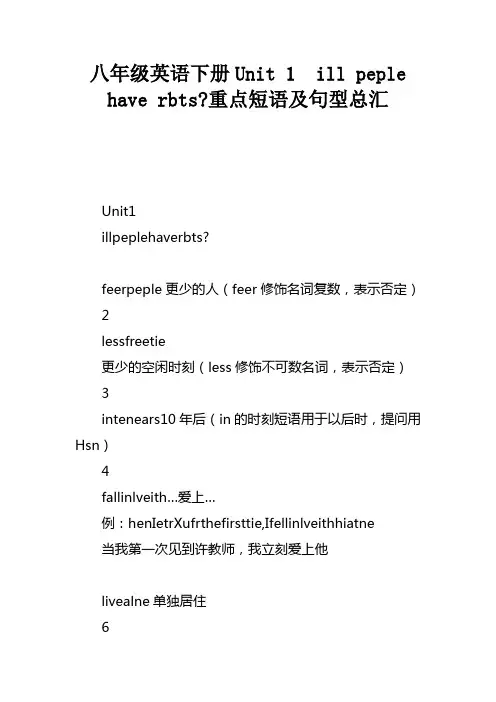
八年级英语下册Unit 1 ill peplehave rbts?重点短语及句型总汇Unit1illpeplehaverbts?feerpeple更少的人(feer修饰名词复数,表示否定)2lessfreetie更少的空闲时刻(less修饰不可数名词,表示否定)3intenears10年后(in的时刻短语用于以后时,提问用Hsn)4fallinlveith…爱上…例:henIetrXufrthefirsttie,Ifellinlveithhiatne当我第一次见到许教师,我立刻爱上他livealne单独居住6feellnel感到孤独(比较:livealne/galng等)Thegirlaledalnealngthestreet,butshedidn’tfeellnel 那女孩独自沿着街道走,但她并非感到孤独7eep/feedapetpig养一头宠物猪8fltthen飞上月球9hundredsf+复数数百/几百(概数,类似还有thusandsf;illinsf)thesaeas和……相同1AbedifferentfrBA与B不同2aeup醒来(aesbup表示“唤醒某人”3getbred变得厌倦(get/bee是连系动词,后跟形容词如tired/angr/exited等)4gsating去滑冰(类似还有ghiing/fishing/sating/bieriding等)ltsf/altf许多(修饰可数名词、不可数名词都能够)6attheeeends在周末7studathenputers在家通过电脑学习8agreeithsb同意某人9Idn’tagree=Idisagree我不同意20napieefpaper在一张纸上(注意paper/infratin/nes/r/her/huser等常考到的不可数名词)nvaatin度假22helpsbithsth/helpsbdsth帮忙某人做某事23andifferentindsfgldfish许多不同种金鱼24liveinanapartent住在公寓里/liventhetelfthflr 住在12楼2liveatN332,ShanghaiStreet住在上海路332号26asareprter作为一名记者27lsart显得精神/看起来伶俐28Areuidding?你在骗我吗29inthefuture在以后/在以后nre=nt…anre再也不(强调多次发生的动作再也不发生)31nlnger=nt…anlnger再也不(强调状态再也不发生)32besides(除…之外还,包括)与exept=but(除…之外,不包括)33beablet与an能、会?(beablet用于各类时态,而an只能用于一样此刻时态和一样过去时态中;havet用于各类时态,而ust只能用于一样此刻时态)例如:Ihavebeenablet/illbeabletspeatlanguages(不能够用an)2hadtstaathe/illhavet(不能够用ust)34bebigandrded大而且拥堵34beinllege在上大学livenaspaestatin住在空间站36dressasuall穿得很随意asuallthing休闲衣饰37inthenextrldup博得世界杯inaard获僵38etrue变成现实39taehundredsfears花几百年的时刻40befuntath看起来有趣41verandveragain一次又一次42beindifferentshapes形状不同43tentearsfrn尔后20年44本单元目标句型:hatduthinlifeillbeliein1000ears?2Thereillbefeertrees、rebuildingsandlesspllutininthefuture?feer;less表示否定之意,别离修饰可数名词和不可数名词;re二者都能够修饰。
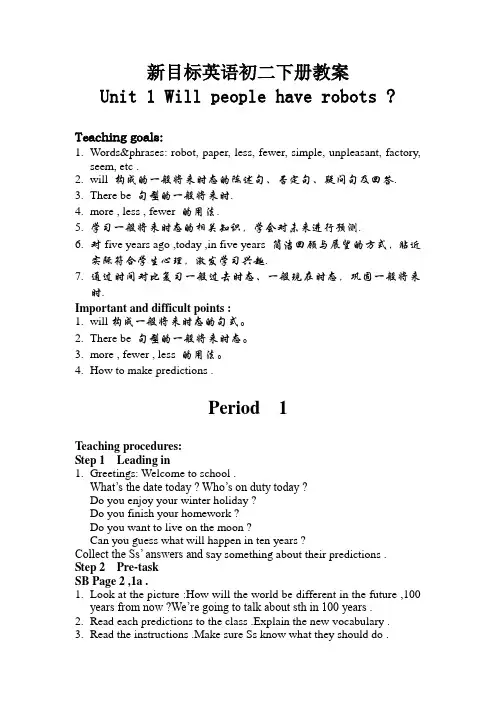
新目标英语初二下册教案Unit 1 Will people have robots ? Teaching goals:1.Words&phrases: robot, paper, less, fewer, simple, unpleasant, factory,seem, etc .2.will 构成的一般将来时态的陈述句、否定句、疑问句及回答.3.There be 句型的一般将来时.4.more , less , fewer 的用法.5.学习一般将来时态的相关知识,学会对未来进行预测.6.对five years ago ,today ,in five years 简洁回顾与展望的方式,贴近实际符合学生心理,激发学习兴趣.7.通过时间对比复习一般过去时态、一般现在时态,巩固一般将来时.Important and difficult points :1.will构成一般将来时态的句式。
2.There be 句型的一般将来时态。
3.more , fewer , less 的用法。
4.How to make predictions .Period 1Teaching procedures:Step 1 Leading in1.Greetings: Welcome to school .What’s the date today ? Who’s on duty today ?Do you enjoy your winter holiday ?Do you finish your homework ?Do you want to live on the moon ?Can you guess what will happen in ten years ?Collect the Ss’ answers and s ay something about their predictions .Step 2 Pre-taskSB Page 2 ,1a .1.Look at the picture :How will the world be different in the future ,100years from now ?We’re going to talk about sth in 100 years .2.Read each predictions to the class .Explain the new vocabulary .3.Read the instructions .Make sure Ss know what they should do .4.Do it by themselves .5.Talk about the answers with the class .Explain :一般将来时态构成: will / be going to +动词原形Step 3 While-taskSB Page 2 ,1b .1.Practise reading the six predictions .2.Read the instructions to Ss .Circle the things you hear on therecording .3.Play the tape twice .4.Play the tape a third time .At the same time ,check the answers .SB Page 2 , 1c .1.Pay attention to the dialogues .2.Read the dialogues fluently .3.Pairwork .Work in pairs to make predictions according to the sample .4.Ask several pairs to share their conversations to the class .SB Page 3 , 2a & 2b .1.Read the predictions .2.Read the instructions and point out the sample answer .3.Play the tape twice .Ss circle the word they hear in each sentences:more , less , fewer .4.Check the answers .学生探究: less , fewer 的区别。
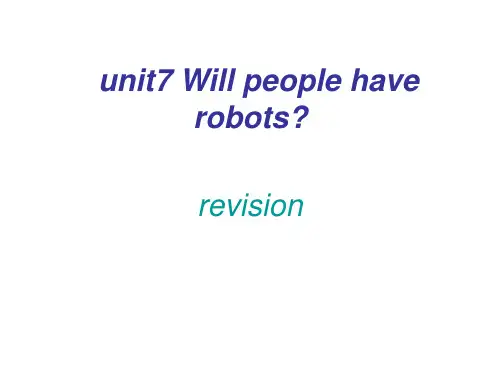
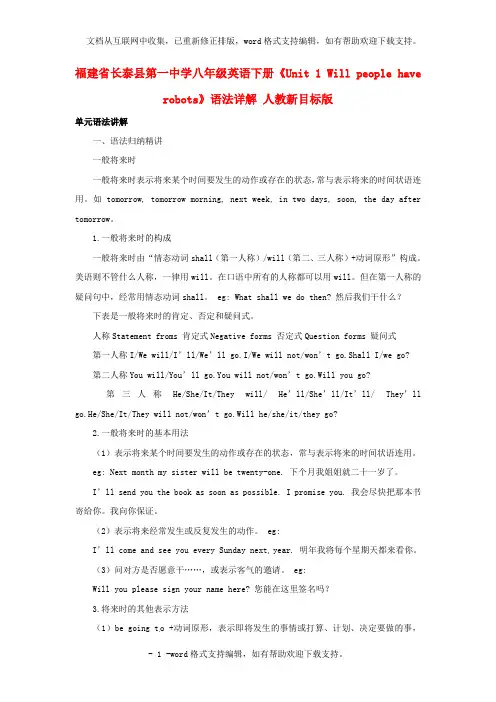
福建省长泰县第一中学八年级英语下册《Unit 1 Will people haverobots》语法详解人教新目标版单元语法讲解一、语法归纳精讲一般将来时一般将来时表示将来某个时间要发生的动作或存在的状态,常与表示将来的时间状语连用。
如tomorrow, tomorrow morning, next week, in two days, soon, the day after tomorrow。
1.一般将来时的构成一般将来时由“情态动词shall(第一人称)/will(第二、三人称)+动词原形”构成。
美语则不管什么人称,一律用will。
在口语中所有的人称都可以用will。
但在第一人称的疑问句中,经常用情态动词shall。
eg: What shall we do then? 然后我们干什么?下表是一般将来时的肯定、否定和疑问式。
人称Statement froms 肯定式Negative forms 否定式Question forms 疑问式第一人称I/We will/I’ll/We’ll go.I/We will not/won’t go.Shall I/we go?第二人称You will/You’ll go.You will not/won’t go.Will you go?第三人称He/She/It/They will/ He’ll/She’ll/It’ll/ They’ll go.He/She/It/They will not/won’t go.Will he/she/it/they go?2.一般将来时的基本用法(1)表示将来某个时间要发生的动作或存在的状态,常与表示将来的时间状语连用。
eg: Next month my sister will be twenty-one. 下个月我姐姐就二十一岁了。
I’ll send you the book as soon as possible. I promise you. 我会尽快把那本书寄给你。
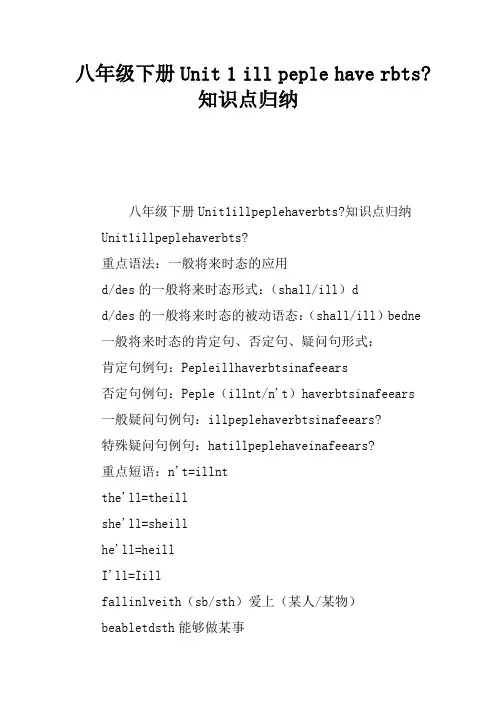
八年级下册Unit 1 ill peple have rbts?知识点归纳八年级下册Unit1illpeplehaverbts?知识点归纳Unit1illpeplehaverbts?重点语法:一般将来时态的应用d/des的一般将来时态形式:(shall/ill)dd/des的一般将来时态的被动语态:(shall/ill)bedne 一般将来时态的肯定句、否定句、疑问句形式:肯定句例句:Pepleillhaverbtsinafeears否定句例句:Peple(illnt/n't)haverbtsinafeears一般疑问句例句:illpeplehaverbtsinafeears?特殊疑问句例句:hatillpeplehaveinafeears?重点短语:n't=illntthe'll=theillshe'll=sheillhe'll=heillI'll=Iillfallinlveith(sb/sth)爱上(某人/某物)beabletdsth能够做某事etrue实现inthefuture未来hundredsf数以百计的thusandsf数以千计的lfr(sb/sth)寻找(某人/某物)ill→uld情态动词ill的原形和过去式a→ight情态动词a的原形和过去式ReadingStrateg(阅读方法)Latthetitleandpiture,andpredithatuillreadabut (看着标题和图片,预知你要阅读那些方面的内容。
)Thishelpsugetreadtaquireneinfratin(这样可以帮助你获得一些新的信息。
)。
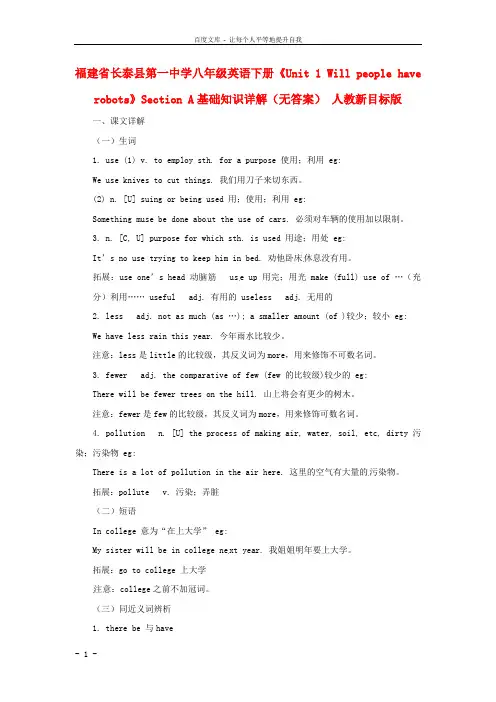
福建省长泰县第一中学八年级英语下册《Unit 1 Will people have robots》Section A基础知识详解(无答案)人教新目标版一、课文详解(一)生词1. use (1) v. to employ sth. for a purpose 使用;利用 eg:We use knives to cut things. 我们用刀子来切东西。
(2) n. [U] suing or being used 用;使用;利用 eg:Something muse be done abo ut the use of cars. 必须对车辆的使用加以限制。
3. n. [C, U] purpose for which sth. is used 用途;用处 eg:It’s no use trying to keep him in bed. 劝他卧床休息没有用。
拓展:use one’s head 动脑筋 us e up 用完;用光make (full) use of …(充分)利用…… useful adj. 有用的 useless adj. 无用的2. less adj. not as much (as …); a smaller amount (of )较少;较小 eg:We have less rain this year. 今年雨水比较少。
注意:less是little的比较级,其反义词为more,用来修饰不可数名词。
3. fewer adj. the comparative of few (few 的比较级)较少的 eg:There will be fewer trees on the hill. 山上将会有更少的树木。
注意:fewer是few的比较级,其反义词为more,用来修饰可数名词。
4. pollution n. [U] the process of making air, water, soil, etc, dirty 污染;污染物 eg:There is a lot of pollution in the air here. 这里的空气有大量的污染物。
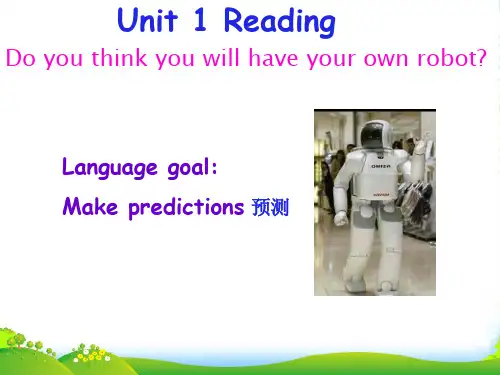
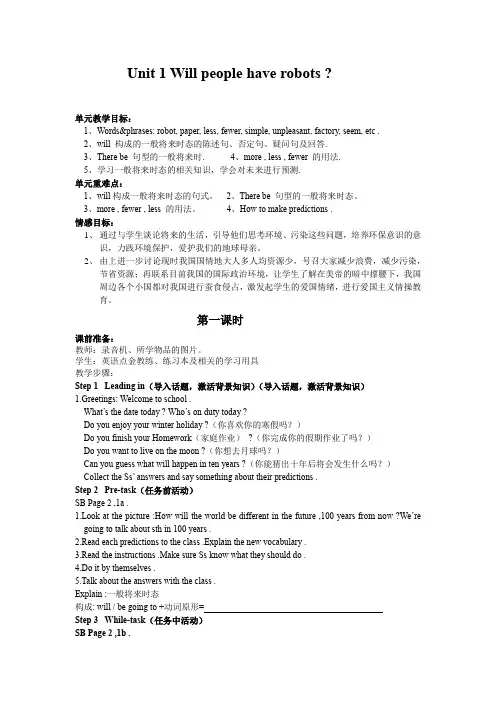
Unit 1 Will people have robots ?单元教学目标:1、Words&phrases: robot, paper, less, fewer, simple, unpleasant, factory, seem, etc .2、will 构成的一般将来时态的陈述句、否定句、疑问句及回答.3、There be 句型的一般将来时.4、more , less , fewer 的用法.5、学习一般将来时态的相关知识,学会对未来进行预测.单元重难点:1、will构成一般将来时态的句式。
2、There be 句型的一般将来时态。
3、more , fewer , less 的用法。
4、How to make predictions .情感目标:1、通过与学生谈论将来的生活,引导他们思考环境、污染这些问题,培养环保意识的意识,力践环境保护,爱护我们的地球母亲。
2、由上进一步讨论现时我国国情地大人多人均资源少,号召大家减少浪费,减少污染,节省资源;再联系目前我国的国际政治环境,让学生了解在美帝的暗中撑腰下,我国周边各个小国都对我国进行蚕食侵占,激发起学生的爱国情绪,进行爱国主义情操教育。
第一课时课前准备:教师:录音机、所学物品的图片。
学生:英语点金教练、练习本及相关的学习用具教学步骤:Step 1 Leading in(导入话题,激活背景知识)(导入话题,激活背景知识)1.Greetings: Welcome to school .What’s the date today ? Who’s on duty today ?Do you enjoy your winter holiday ?(你喜欢你的寒假吗?)Do you finish your Homework(家庭作业)?(你完成你的假期作业了吗?)Do you want to live on the moon ?(你想去月球吗?)Can you guess what will happen in ten years ?(你能猜出十年后将会发生什么吗?)Collect the Ss’ answers and say something about their predictions .Step 2 Pre-task(任务前活动)SB Page 2 ,1a .1.Look at the picture :How will the world be different in the future ,100 years from now ?We’re going to talk about sth in 100 years .2.Read each predictions to the class .Explain the new vocabulary .3.Read the instructions .Make sure Ss know what they should do .4.Do it by themselves .5.Talk about the answers with the class .Explain :一般将来时态构成: will / be going to +动词原形=Step 3 While-task(任务中活动)SB Page 2 ,1b .1.Practise reading the six predictions .2.Read the instructions to Ss .Circle the things you hear on the recording .3.Play the tape twice .(放录音,两次)4.Play the tape a third time .At the same time ,check the answers .SB Page 2 , 1c .1、Pay attention to the dialogues .2、Read the dialogues fluently .3、Pairwork .Work in pairs to make predictions according to the sample .4、Ask several pairs to share their conversations to the class .SB Page 3 , 2a & 2b .1、Read the predictions .2、Read the instructions and point out the sample answer .3、Play the tape twice .Ss circle the word they hear in each sentences: more , less , fewer .4、Check the answers .学生探究: less , fewer 的区别。
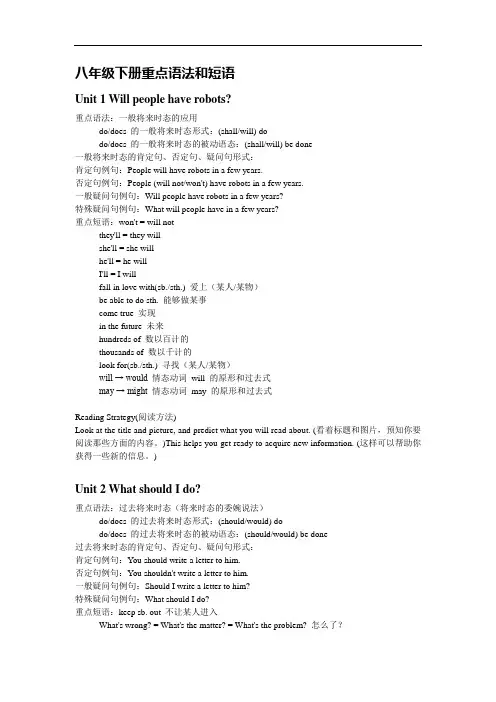
八年级下册重点语法和短语Unit 1 Will people have robots?重点语法:一般将来时态的应用do/does 的一般将来时态形式:(shall/will) dodo/does 的一般将来时态的被动语态:(shall/will) be done一般将来时态的肯定句、否定句、疑问句形式:肯定句例句:People will have robots in a few years.否定句例句:People (will not/won't) have robots in a few years.一般疑问句例句:Will people have robots in a few years?特殊疑问句例句:What will people have in a few years?重点短语:won't = will notthey'll = they willshe'll = she willhe'll = he willI'll = I willfall in love with(sb./sth.) 爱上(某人/某物)be able to do sth. 能够做某事come true 实现in the future 未来hundreds of 数以百计的thousands of 数以千计的look for(sb./sth.) 寻找(某人/某物)will → would 情态动词will 的原形和过去式may → might 情态动词may 的原形和过去式Reading Strategy(阅读方法)Look at the title and picture, and predict what you will read about. (看着标题和图片,预知你要阅读那些方面的内容。
)This helps you get ready to acquire new information. (这样可以帮助你获得一些新的信息。
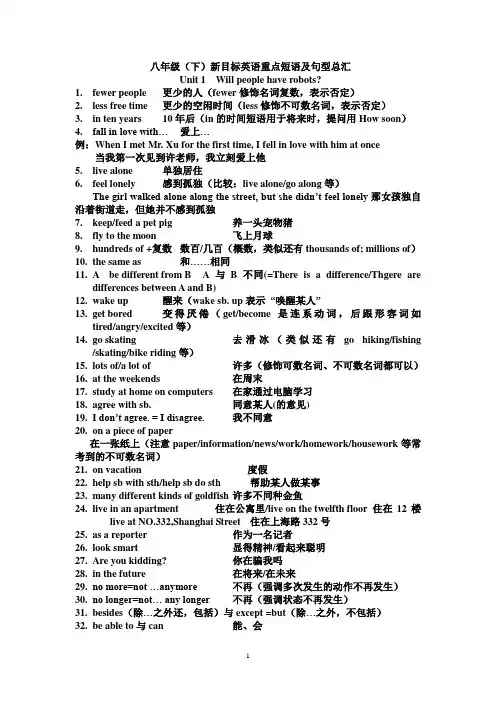
八年级(下)新目标英语重点短语及句型总汇Unit 1 Will people have robots?1.fewer people 更少的人(fewer修饰名词复数,表示否定)2.less free time 更少的空闲时间(less修饰不可数名词,表示否定)3.in ten years 10年后(in的时间短语用于将来时,提问用How soon)4.fall in love with…爱上…例:When I met Mr. Xu for the first time, I fell in love with him at once 当我第一次见到许老师,我立刻爱上他5.live alone 单独居住6.feel lonely 感到孤独(比较:live alone/go along等)The girl walked alone along the street, but she didn’t feel lonely那女孩独自沿着街道走,但她并不感到孤独7.keep/feed a pet pig 养一头宠物猪8.fly to the moon 飞上月球9.hundreds of +复数数百/几百(概数,类似还有thousands of; millions of)10.the same as 和……相同11.A be different from B A与B不同(=There is a difference/Thgere aredifferences between A and B)12.wake up 醒来(wake sb. up表示“唤醒某人”13.get bored 变得厌倦(get/become是连系动词,后跟形容词如tired/angry/excited等)14.go skating 去滑冰(类似还有go hiking/fishing/skating/bike riding等)15.lots of/a lot of 许多(修饰可数名词、不可数名词都可以)16.at the weekends 在周末17.study at home on computers 在家通过电脑学习18.agree with sb. 同意某人(的意见)19.I don’t agree. = I disagree.我不同意20.on a piece of paper在一张纸上(注意paper/information/news/work/homework/housework等常考到的不可数名词)21.on vacation 度假22.help sb with sth/help sb do sth 帮助某人做某事23.many different kinds of goldfish 许多不同种金鱼24.live in an apartment 住在公寓里/live on the twelfth floor 住在12楼live at NO.332,Shanghai Street 住在上海路332号25.as a reporter 作为一名记者26.look smart 显得精神/看起来聪明27.Are you kidding? 你在骗我吗28.in the future 在将来/在未来29.no more=not …anymore不再(强调多次发生的动作不再发生)30.no longer=not… any longer不再(强调状态不再发生)31.besides(除…之外还,包括)与except =but(除…之外,不包括)32.be able to与can 能、会●(be able to用于各种时态,而can只能用于一般现在时态和一般过去时态中;have to用于各种时态,而must只能用于一般现在时态)例如: 1.Ihave been able to/will be able to speak two languages. (不可以用can)2. had to stay at home/ will have to (不可以用must)34.be big and crowded 大而且拥挤33.be in college 在上大学34.live on a space station 住在空间站35.dress casually 穿得很随意casual clothing 休闲服饰36.win the next World Cup 赢得世界杯win award 获僵e true 变成现实38.take hundreds of years 花几百年的时间39.be fun to watch 看起来有趣40.over and over again 一次又一次41.be in different shapes 形状不同42.twenty years from now 今后20年43.本单元目标句型:1.What do you think life will be like in 1000 years?2.There will be fewer trees、more buildings and less pollution in the future.●fewer;less表示否定之意,分别修饰可数名词和不可数名词;more二者都可以修饰。
福建省长泰县第一中学八年级英语下册《Unit 1 Will people have robots》Self Check&Reading基础知识详解人教新目标版一、课文详解(一)生词1. myself pron. used when the speaker or writer is also the person affected by an action (反身代词) 我自己;我本人 eg:I like looking at myself in the mirror. 我非常喜欢照镜子。
拓展:all by oneself 独自地;独立地2. simple adj. not difficult; easily done or understood 简易的;简单的 eg:I think such a dish is simple to make. 我认为这样一道菜做起来很简单。
3. such adj. of this kind 这样的;这种的 eg:We won’t find such good books anywhere. 任何地方我们都不会找到这么好的书。
4. shape n. the outline of something 外形;形状 eg:The table is round in shape. 这桌子是圆形的。
5. possible adj. that can be done 可能的;可能做到的 eg:Please come here as soon as possible 请尽快来这儿拓展:as … as possible = as … as one can /could 尽可能地 if possible 如果可能 possibly adv. 可能地(二)短语1. come true 意为“(希望、理想、梦想、愿望等)实现,达到”,其中come为系动词。
eg: His dream came true at last. 他的梦想最后终于实现了。
1 / 2
Unit1 重点短语
fewer people /less free time 更少的人/更少的空闲时间
in ten years 10年后
twenty years from now =in twenty years 今后20年
fall in love with… 爱上…
5. live alone/ feel lonely 单独居住/感到孤独
keep/feed a pet pig 养一头宠物猪
fly rockets to the moon 乘火箭飞上月球
hundreds of /thousands of/millions of +复数 数百/千/百万
the same as / be different from 和……相同/不同
wake up/wake sb. up 醒来/唤醒某人
get bored 变得厌倦
at/on the weekends 在周末
study at home on computers 在家通过电脑学习
agree with sb. 同意某人(的意见)
a piece of paper/information/news/advice 一张纸/一条信息/建议
on vacation 度假
help sb with sth/help sb do sth 帮助某人做某事
live in an apartment 住在公寓里/
as a reporter 作为一名记者
look smart 看上去整洁/显得精神/看起来聪明
in the future 在将来/在未来
be in college 在上大学
live on a space station 住在空间站
dress casually / casual clothing 穿得很随意/ 休闲服饰
win the next World Cup /awards 赢得世界杯/获奖
come true 变成现实
be fun to watch 看起来有趣
2 / 2
over and over again 一次又一次
be in different shapes 形状不同